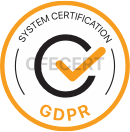The digital trust relies on various fundamental features such as transparency, security, reliability, privacy, and accountability. These features help establish trust between businesses and customers and ensure the safe and secure execution of digital transactions.


How can businesses create digital trust?
Businesses can build digital trust by implementing robust security and privacy measures, being transparent about data practices, providing reliable and consistent services, and taking responsibility for their actions. This can be achieved through clear and concise communication with customers, regular testing and auditing of systems, and adherence to industry standards and best practices.
The ISO 27001:2022 Information Security Management System standard provides a globally accepted framework for establishing digital trust.
Risk Management: ISO 31000 helps identify risks, while ISO 27001 assists in identifying and mitigating digital threats.
Compliance with Relevant Laws and Regulations: ISO 27001 guides compliance with information security laws and regulations. Additionally, integrating ISO 27701 Personal Data Management System is recommended for compliance with regulations such as KVKK and GDPR. Considering sector-specific needs, compliance with ISO 50001, ISO 14001, and ISO 45001 should be considered.
Information Security Policies and Procedures: ISO 27001 requires the establishment and implementation of information security policies and procedures, with guidance provided by ISO 27002.
Training and Awareness: ISO 27001 ensures that employees receive information security training.
Monitoring and Improvement: ISO 27001 encourages continuous review of information security practices for ongoing improvement.
Internal Audits and External Audits: ISO 27001 requires regular internal audits and external audits to assess security.
Emergency Preparedness: ISO 27001 ensures preparedness for information security emergencies. ISO 22301 Business Continuity Management System supports rapid preparation for unforeseen business interruptions.
Supply Chain Security: ISO 27001 and ISO 28001 ensure that suppliers adhere to security standards, reducing risks.
Before building digital trust, organizations can conduct a gap analysis with our expert auditors to determine what actions to take. The functioning and construction of digital trust can be explained through the following five strategies:
-
Artificial Intelligence-Based Data Monitoring: Use AI algorithms to detect missing or unexpected data to ensure data accuracy and reliability.
-
Data Security: Make data management trustworthy and use data as a third party respecting the rights of others.
-
Blockchain Usage: Use blockchain as the foundation of digital trust to ensure data security and reduce technological risks using quantum-resistant encryption techniques.
-
Customer Trust: Build trust by providing transparent communication about data management processes and carefully selecting third-party operators.
-
Capability and Infrastructure Investment: Invest in capabilities to develop and implement AI-based monitoring and blockchain-supported security strategies. Also, maintain digital trust by investing in the necessary technology and systems.
Results of a Digital Trust Research in the Digital World:
3,602 companies and technology/security managers participated in the research. 69% of companies anticipate an increase in cybersecurity spending in 2022. The purpose of cybersecurity is shifting towards building trust and company growth, with 54% of participants considering a framework beyond cybersecurity and controls. Only 30% of participants believe real-time threat intelligence is fundamental to their business models.
Companies and organizations that make digital trust part of their business become resilient against risks, preserve customer reputation, and determine security strategies according to laws and regulations. You can always contact us at sales@cfecert.co.uk for support with our Information Security training, gap analysis, and certification services!








